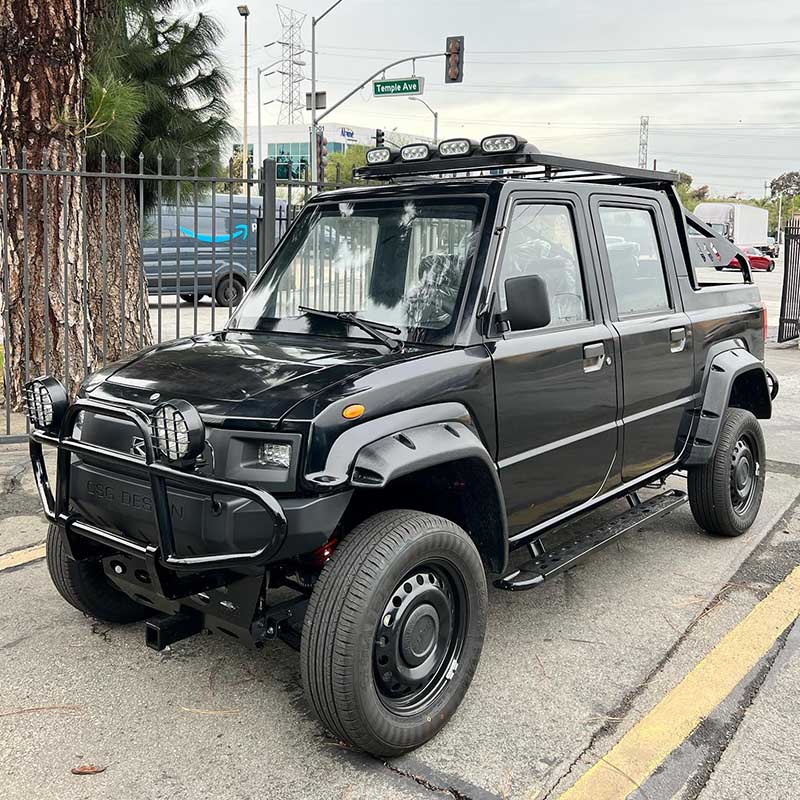Comparing Performance: 4-Seat Electric Mini Pickup Truck vs. Traditional Gas-Powered Mini Pickup Trucks
2024-05-23
The automotive landscape is undergoing a seismic shift with the rise of electric vehicles (EVs). Among the new entrants are 4-seat electric mini pickup trucks, which promise to deliver the functionality of traditional mini pickup trucks with the added benefits of electric power. But how do these electric mini trucks stack up against their gas-powered counterparts in terms of performance? Let's dive into the details and compare the two across several key performance metrics.
Acceleration and Power Delivery
1. Electric Mini Pickup Trucks:
- Instant Torque: One of the standout features of electric vehicles is their ability to deliver instant torque. This translates to quick acceleration from a standstill, making electric mini pickups feel more responsive and lively.
- Smooth Power Delivery: Electric motors provide a smooth and consistent power delivery, enhancing the driving experience and making urban driving and off-road maneuvers more enjoyable.
2. Gas-Powered Mini Pickup Trucks:
- Traditional Acceleration: Gas engines typically require higher RPMs to deliver peak torque, resulting in a less immediate response compared to electric motors. However, many modern gas-powered pickups are equipped with turbochargers to boost low-end torque.
- Transmission Lag: The presence of multi-gear transmissions in gas-powered trucks can introduce a slight lag during gear changes, affecting the smoothness of power delivery.
Range and Refueling
1. Electric Mini Pickup Trucks:
- Range: The range of electric mini pickups varies depending on the battery size, typically between 100 to 250 miles on a full charge. This range is generally sufficient for daily commuting and short trips but can be limiting for long-distance travel.
- Charging Time: Charging times can vary from 30 minutes to several hours, depending on the type of charger used. Fast chargers can replenish the battery to 80% in about 30 minutes, while home charging systems might take 6-8 hours for a full charge.
2. Gas-Powered Mini Pickup Trucks:
- Range: Gasoline mini pickups usually offer a range of 300 to 400 miles on a full tank, making them more convenient for long trips and rural driving where charging infrastructure might be sparse.
- Refueling Time: Refueling a gas-powered truck takes just a few minutes, providing a quick turnaround for those on the go.
Towing and Hauling
1. Electric Mini Pickup Trucks:
- Towing Capacity: Electric mini pickups generally offer competitive towing capacities, often between 1,500 to 4,000 pounds, depending on the model and battery power. However, towing can significantly reduce the vehicle's range.
- Payload Capacity: Payload capacities are typically robust, ranging from 500 to 1,500 pounds. The even weight distribution provided by the low-mounted battery pack can enhance stability when carrying heavy loads.
2. Gas-Powered Mini Pickup Trucks:
- Towing Capacity: Gas-powered mini trucks traditionally have higher towing capacities, often exceeding 4,000 pounds. This makes them more suitable for heavy-duty tasks and long-distance towing.
- Payload Capacity: These trucks can handle similar or slightly higher payloads compared to their electric counterparts, benefiting from a longstanding design optimized for load-carrying efficiency.
Maintenance and Longevity
1. Electric Mini Pickup Trucks:
- Maintenance: Electric vehicles have fewer moving parts than internal combustion engines, leading to lower maintenance requirements. There are no oil changes, fewer brake replacements (thanks to regenerative braking), and less wear and tear on the drivetrain.
- Longevity: Battery life is a key consideration. Most electric vehicle batteries are designed to last over 100,000 miles, with warranties often covering 8 years or more. Battery degradation can impact long-term range and performance, but advancements in battery technology are continually improving longevity.
2. Gas-Powered Mini Pickup Trucks:
- Maintenance: Regular maintenance for gas-powered trucks includes oil changes, transmission fluid changes, spark plug replacements, and more. These trucks generally require more frequent servicing.
- Longevity: Gas engines can also be very durable, often lasting well over 150,000 miles with proper maintenance. However, the complexity of internal combustion engines means there are more components that can fail over time.
Environmental Impact
1. Electric Mini Pickup Trucks:
- Zero Emissions: Electric trucks produce no tailpipe emissions, making them a cleaner choice for the environment. This is particularly beneficial for reducing urban air pollution.
- Renewable Energy Compatibility: Charging an electric vehicle with renewable energy sources can further reduce its environmental footprint, making it a more sustainable option.
2. Gas-Powered Mini Pickup Trucks:
- Emissions: Gas-powered trucks emit CO2 and other pollutants, contributing to air pollution and climate change. Even the most efficient gasoline engines cannot match the environmental benefits of electric motors.
- Fuel Dependency: Gasoline is a fossil fuel, and its extraction, refining, and transportation have significant environmental impacts.
Conclusion
The 4-seat electric mini pickup truck offers numerous performance advantages over traditional gas-powered mini pickup trucks, including instant torque, lower maintenance, and environmental benefits. However, gas-powered mini pickups still hold the edge in terms of range, refueling convenience, and heavy-duty towing capacity. The choice between the two will ultimately depend on your specific needs and priorities—whether you value quick acceleration and lower environmental impact or require long-range capabilities and heavy-duty performance. As electric vehicle technology continues to advance, we can expect the gap between these two options to narrow, offering even more compelling reasons to go electric.



